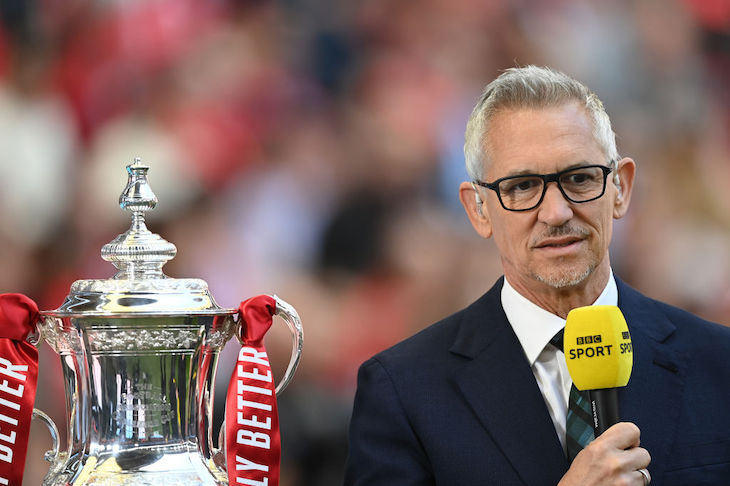The Gary Lineker debacle has exposed the breathtaking historical and political ignorance of the supposedly educated. Lineker’s suspension – and subsequent return – has also demonstrated (as if we didn’t know it) the power of the managerial class establishment. But the transmission of Match of the Day last Saturday sans Gary and his co-mutineers revealed something else. The truth about much modern television is that the percentage of actual content is dwarfed by the amount of waffle.
As the row rumbled on, the BBC was contractually obliged to run the day’s football highlights package. Without the banter, chat and flimflam Lineker is paid £1.3 million a year for, this clocked in at a mere 20 minutes. For some reason, there was no title sequence or ‘iconic’ theme tune either, which was a relief for me as I can’t hear it without getting an earworm of the lyrics of the hymn version we sang at school. (‘Why don’t you put your trust in Jesus, and ask him to come in?’)
Television is awash with hours and hours of snail-paced blether
Next weekend, normal service will resume: Lineker and his chums will be back – telling you what you’re about to see, what you’re seeing right now, or what you have just seen. What is coming up, what you might have missed, flashbacks to what you saw five minutes ago. Still to come. Already tonight.
Match of the Day isn’t, of course, the only show in which this fluff predominates. Presenters often hand over to presenters, like a giggling hall of mirrors. This is all mostly delivered with the overexcited zizz of the latter-day Blue Peter, the mirthless laugh of the children’s entertainer or nursery assistant. Even continuity announcers speak in this pally, overly-bright register, as if they’re about to say ‘Single file, quicksticks, coats on hooks!’
This phenomenon crept up on us over decades, but went into overdrive in the late noughties. Simon Cowell stretched the X Factor final 2008 into an epic which is quite possibly still going on; a series of seven-minute ad breaks with occasional trailers and even more infrequent glimpses – mere slivers – of the actual programme. At the time this seemed a flagrant abuse that was sure to get stamped on by Ofcom, wasn’t it? We weren’t to know it was the future.
In fact, this was just the beginning of televisual bloat in general. As the available space increased, the American networks and streamers expanded inevitably to fill it, with their interminable, ponderously told multi-part dramas. Older TV is often regarded and derided as slow, but compared to the drag of most Netflix it positively zips by. Economy and précis have been lost. Even the better shows dawdle. The last series of Succession positively ambled, with a couple of events an episode at best, and strange excursions away from the main narrative – the Republican presidential selection episode, for example – that were a blatant waste of everybody’s time.
I recently watched Melissa, a three-part BBC thriller from 1974. Yes it was stagey, mannered, and somewhat lacking in emotional reaction by our standards. There was a lot of decanter acting and people saying ‘There’s not much to tell, Inspector’ and ‘I don’t know…but I intend to find out.’ But by God, it moved like the wind and expected you to pay attention to every twist and turn, which came at a rate of about one every couple of minutes. The same story would take about 15 episodes on Netflix, and would come with beautiful but pointless cinematography – drone cameras sweeping up and down and around the locations – and a lot of strained attempts at significance.
A friend watches absolutely tons of modern television and is often moved to tears by it. But ask him a month later what happened in that series he loved so much and he can’t tell you. This is memorable TV that nobody remembers.
You’d think changing technology would speed things up. This seemed to be the curve we were on – a lot of TV drama in the 90s and early noughties was dizzyingly speedy – until the streaming boom. Indeed, YouTube videos have got noticeably more straight-in with their content during the last decade, and thankfully the clumsy ‘How have you been keeping then Steve me old mate?’ ‘I’ve been doing quite well thanks, all told, Sandra, can’t complain’ introductory breeze-shooting of podcasts has dried up as the form has come into itself.
By contrast, television is awash with hours and hours of snail-paced blether. Deciding to follow a TV series is now a major undertaking. You have to cancel the papers and tell your friends you’ll see them sometime next year. The oversupply of soap operas on terrestrial – Coronation Street now takes up six hours a week, sometimes more – means committing to just one is making a lifestyle choice as big as a personal training routine or a religious ritual.
So we can thank Lineker and the presenter-less Match of the Day for, hopefully, an inadvertent glimpse of the future. It was a reminder that, in show business, like any other business, it is best to get a move on, to get on and get off. Will Lineker and his chums take notice and change their ways? If they don’t, viewers – who have had a blissful taste of TV without the waffle – are unlikely to be grateful.







Comments